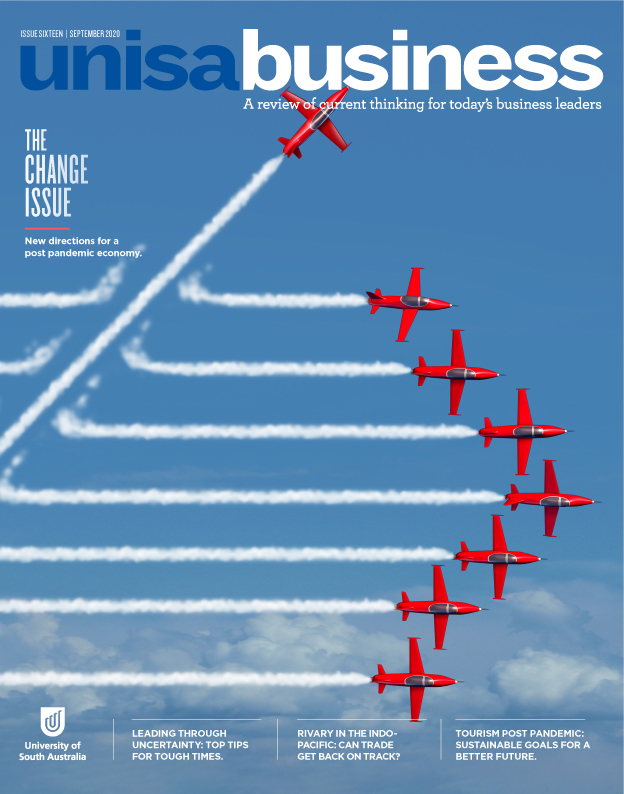01 September 2020
Letter from the Executive Dean: Professor Andrew Beer
Whatever we read, whatever we listen to, and wherever we look, there’s no denying the impact of COVID-19 on our economy. On a state, national and international level, the pandemic has triggered unprecedented change across every aspect of our lives – and from an economic perspective, the fallout is expected to last for years.
Sharp drops in global GDP have placed the world in the deepest global recession in decades, and despite the efforts of governments to counter the downturn, the financial implications are severe.
Over the coming year, unemployment rates in some of our major trading partners are likely to approach 20 per cent and – more worryingly – remain there for some time. Globally, interest rates are low, but current uncertainties cast a long shadow of over the decision making of corporate and individual investors alike.
Many have suggested COVID-19 and its associated disruptions to supply chains may add to a growing appetite for protectionist trade policies and, in Australia, recent challenges in our relationship with China only add to the ambiguities of economic planning.
There is much to reflect upon as we look forward and wonder how to achieve some form of ‘bounce back’ in business.
Earlier this year, I read a report from the Commonwealth’s Office of the Chief Economist which used linked, longitudinal data from many sources to analyse the business performance of tens of thousands of Australian enterprises. The conclusion was both simple and profound: businesses that performed best had either invested in innovation – with respect to their processes, products or market-segments – or had successfully established consumer loyalty, guaranteeing their profitability and ongoing strength in the marketplace.
It’s an insightful finding, and one that perhaps highlights the way forward post pandemic. Much of the work we do in UniSA Business also addresses key issues of innovation and brand building – the bedrock for a solid foundation in a post-COVID-19 world.
We are deeply engaged with questions of business inception, growth and succession.
Today, entrepreneurial ecosystems – the environments that support ongoing innovation and the growth of multiple specialised industries – are acknowledged as fundamental to economic growth. And, in UniSA Business we contribute to the development of a South Australian and national entrepreneurial ecosystems through our work through the Innovation and Collaboration Centre (ICC) and the Australian Centre for Business Growth (AUCBG) – the former guiding emerging entrepreneurs in the establishment of new businesses, and the latter assisting medium sized enterprises grow their turnover and profitability. Both make fundamental contributions to the global need for both new businesses and well-performing established firms to generate employment and future prosperity.
Importantly, all these things are needed to rebuild the economy and we at UniSA have so much to offer.
In this issue of unisabusiness magazine (our very first solely online edition) we reflect on the world in flux; the changing nature of the economy, of business, and of life. Curiously, this issue was always intended to address ‘change’ and was planned well before COVID-19; ironically change has since become the sole constant in more ways than ever.
Whether you need insights about leading through uncertainty, how to embrace artificial intelligence in business, or even ideas about the future of trade between Australia and China, there is something here for you. And while there’s no doubt we have a steep learning curve ahead of us, we hope that these articles will provide some guidance, direction and understanding on the way forward.
Finally, it is important to acknowledge UniSA Business has also gone through its own change since the beginning of this year. Embracing the opportunity to reorganise and transition from a Division of UniSA, we have become an integrated Academic Unit, with the associated efficiencies and potentials that this brings. As part of that change, Professor Marie Wilson, Pro-Vice-Chancellor of the Business School has been elevated to the role of Chief Academic Services Officer.
Now, it is my privilege to build on her legacy, to continue to reach out and engage with the business community, to deliver innovative world-class research, the best possible knowledge, and extraordinary excellence in business education.



